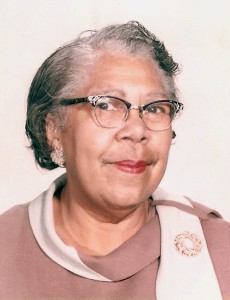One hundred years ago, a few dedicated women helped start the Women’s College of Delaware in 1914. This was a major milestone on the path to gender equality; however, it is important to recognize this achievement was not extended to non-white Delawareans until 1950, when the University of Delaware was forced to integrate.

Mrs. Cora Berry-Saunders in the 1960s. She earned her Master’s Degree in Education in 1951. Image courtesy of the Hinson Family.
Of the first ten African American students, three were women. The first minority woman to receive a graduate degree from the newly desegregated University of Delaware was Cora Berry-Saunders. She received her Master’s Degree in Education in 1951, after teaching for many years at Howard High School in Wilmington, Delaware. She was a vital member of the New London Road Community (click here for podcast on the importance of education in this community), which was where African-Americans lived in a segregated Newark. According to Crystal Haymen Simms,Cora Berry-Saunders was also a teacher at the New London Avenue Elementary School before desegregation, and at Central Elementary after desegregation. She was the 3rd and 4th grade teacher for that last school year before the final closing of the New London Avenue School (1957-58). She loved the arts, and she adored poetry. Students in her classes had to learn l-o-n-g poems on a weekly basis and recite them before the class. To this day, her students have no fear of standing up and speaking publicly. Many of her students later became UD grads. Her attendance and graduation reflects her weighty personal achievements and the slow acceptance of integration and Newark’s growing diversity.

Current doctoral student Patrese Robinson-Drummer. She is carrying out research in the area of behavioral neuroscience. Image courtesy Robinson-Drummer.
Today, the University of Delaware is highly focused on promoting equity and inclusion in order to better reflect surrounding communities. A current Blue Hen we have chosen to highlight is Patrese Robinson-Drummer, who received a Bachelor’s Degree in Animal Science from UD in 2010, and she is now pursuing her PhD at the University of Delaware in Behavioral Neuroscience. Her research explores the ontogeny and mechanisms of memory and learning using animal models. Between these degrees she earned a Master’s degree from St. Joseph’s University (Philadelphia, Pa.) in Experimental Psychology. Ms. Robinson-Drummer is satisfied with life at UD, although she is mindful of her minority status. She recommends: “don’t be afraid to be a minority; it’s what makes you special, it’s what makes you yourself.”
University Institutions like the English Language Institute and the Center for Diversity Studies are especially focused on promoting an increasingly inclusive campus (see recent Review article). The goal is not without its challenges, as witnessed this fall (see recent Review editorial), but both the Path to Prominence and the new Delaware Will Shine strategic plans place inclusion and equity as a top priority.
By: Olivia Baumgardner & Wanwen (June) Zhu